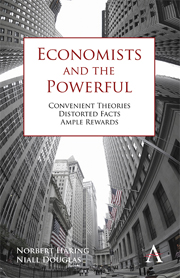Chapter 3 - The Power of the Corporate Elite
Published online by Cambridge University Press: 05 February 2013
Summary
Half of the directors I've met on corporate boards don't know anything about business. They are not going to do anything that not only gets them kicked off that board but that reduces their chances of getting on another one.
—Warren Buffett, 2009James Cayne's most important qualification for his later job as chief executive officer (CEO) of a large investment bank was a career as a professional card player. This enabled him to befriend other bridge aficionados at the helm of Bear Stearns. Firmly installed at the top, he felt completely free to pursue his own interests. In the summer of 2007, he was incommunicado at a bridge tournament in Nashville while two Bear Stearns hedge funds suffered a severe crisis. In the following spring, he was unreachable again for days at a bridge tournament while Bear Stearns was at the brink of bankruptcy (Altaner 2007).
CEOs do not necessarily have an inner urge to do what is in the interest of shareholders, as this example shows. Mainstream economic theory recognized this at least two decades ago. It came up with principal–agent theory and proposed a solution to the problem called “pay-for-performance.” Principal–agent theory revolves around the idea that the principals (i.e. the owners or stakeholders of a corporation) have to give their agents (i.e. top management) wide latitude for making decisions because they cannot specify in advance how a manager should act in every circumstance. They also lack the information to evaluate individual management decisions.
- Type
- Chapter
- Information
- Economists and the PowerfulConvenient Theories, Distorted Facts, Ample Rewards, pp. 107 - 140Publisher: Anthem PressPrint publication year: 2012



